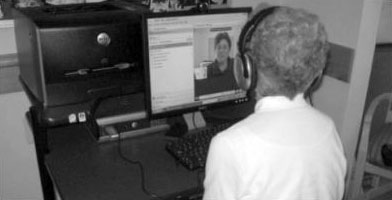Medford Leas is proud of its traditions that go back 40 years, as well as its Estaugh heritage, which goes back much farther. However, Medford Leas is not frozen in time; it is very much a work in progress. Every department has innovative technological projects in the works. Some projects are partly or fully implemented; some are still on the drawing board; and some are only a gleam in a manager’s eye.
The Computerized Brain Fitness Program and the Arboretum’s Global Positioning System have already been described.
In 2011, CEO Jeremy Vickers began using the private, password-protected section of this website to communicate with residents.
The innovative computer program which will impact most directly on all residents and staff will be POS (Point of Service). This system, which appeared first in the dining rooms, is designed to simplify and expedite service. Eventually, it will be possible to enter orders on a flat touchscreen in the dining room and have a ticket containing the order printed in the kitchen. Much needs to be done before this system will be fully implemented. For example, after all of the computer screens, printers, etc. have been installed, it will be necessary to input every menu item (every soup, salad, entree, dessert, and even every condiment, such as sugar, mayonnaise, sour cream, lemons, etc.) Later, POS will be used to simplify dinner reservations and will aid in planning catered events. Eventually, Medford Leas will become a virtually cash-free environment, as the Coffee Shop, Gift Shop, Thrift Shop, and Hair Salon start to use POS card swiping mechanisms, such as those found on cruise ships. Residents have already been issued cards which identify them. When those cards are used in the POS system, the charges will go directly to Accounting to be billed to the appropriate resident’s account.
Perhaps most relevant to the physical well-being of Medford Leas residents are the innovations in medical record keeping which will improve the completeness and accessibility of every resident’s medical history. Health Services will use Doc-Star, a scanner-type program, to input data and archive all medical information. “Advanced Answers on Demand,” another piece of software, will customize forms and create a charting system, including sub-folders. Existing data are being entered into the system, all medical information is being archived, and staff are being trained.
Medical data on individual residents will be available whenever and wherever needed. On every medical floor, nurses will have access to wireless computers. They will be able to locate medical records without flipping through charts, and input current resident information which will become part of the permanent medical record. Also, wireless laptops will accompany the medication carts. At the resident’s bedside, medical personnel will be able to confirm medication type and dosage, check on allergies, and report resident reaction to the medication. The physicians and nurse practitioners will carry notebooks (wireless tablets) to input data.
Medical and non-medical staff who need to use medical records will have access with different levels of permission. For example, the Accounting Department, using POS for billing, will have limited access to medical details. Staff, using Microsoft Outlook for scheduling residents’ medical appointments, will have a different level of access. Another safety precaution will be the daily backup of medical data by the staff of Information Technology.
Just as the various departments of Medford Leas make use of the technologies of the 21st Century, so too do certain savvy residents. Some of those whose families are spread to the far ends of the earth keep in touch with Skype, a free on-line telephone service. Other residents are creating their own videos to share on-line with friends and family. Some others are eagerly taking advantage of the new wireless technologies. It is exciting to imagine the time when today’s technological innovations become part of tomorrow’s traditions.

